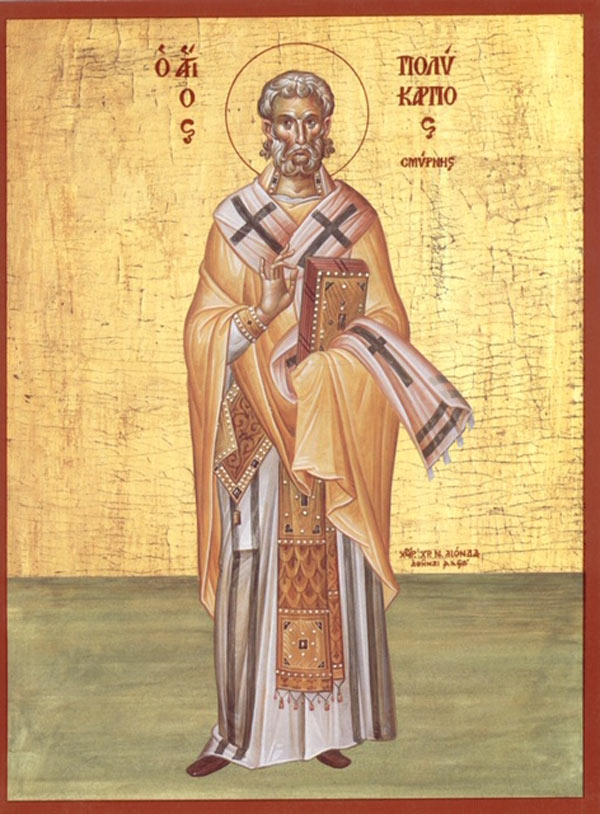
As we heard in the Gospel reading, the Lord describes to us vividly His Second Coming, and the importance of love for others in action that is the key to enter His heavenly kingdom. This great love can be seen in the lives of the saints, such as St. Polycarp, who is also commemorated today.
St. Polycarp is a prominent figure in the Church. He was born in Ephesus to Christian parents, at the time when the Apostle and Evangelist St. John the Theologian was still living there. The young Polycarp wanted to be close to the Apostle, and became his disciple. From the age of 20 he accompanied St. John on his Apostolic tours, listening carefully to his teachings and trying to apply them. He particularly was impressed by the Apostle’s teaching on love for God and other people, which was St. John’s favorite subject to talk about. This spirit of love that St. Polycarp received from the Holy Apostle was the foundation for his subsequent ecclesiastical ministry. He was later ordained as Bishop of Smyrna by St. Voukolos (who had been made Bishop by St. John the Theologian himself).
The work of St. Polycarp in those early years in Smyrna was difficult and dangerous. Heretics had begun to appear, invading the area like “savage wolves,” as St. Paul described them (see Acts 20:29). As a good shepherd, St. Polycarp watched over his faithful flock, countering the distorted beliefs of the heretics and teaching Orthodox doctrine as received by St. John the Apostle. As a result, many who had been swayed by heretical teachings returned to the Church. At the same time, St. Polycarp continued to strengthen God’s people to be firm in their faith in Christ, and not be frightened by the threats of the idolaters during the times of mass persecution. He was interested not only in teaching the Christians of Smyrna, but also in the wider region. That is why, in imitation of the Apostles, he toured the cities and villages on his own to enlighten souls with the light of the Gospel. These visits also served to strengthen the faith of Orthodox living in these areas. He also sent letters to the various local churches, even going as far as the Christian community of Philippi in Greece. Unfortunately, only one of these letters has survived.
Not only did the Saint express his love for Christians by tending to their spiritual needs, he also was interested in helping them with their material needs as well, particularly the care of orphans. As a priest while still in Smyrna, he had received the title of Orphanotrophos (“protector of orphans”) from his Bishop, St. Voukolos. As the loving father of all, St. Polycarp as Bishop served the people. He empowered the weak, comforted the mourning and depressed, healed the sick, and gave alms to the poor. Those who were in need were all comforted and assisted. There was one instance where Smyrna was saved from a great fire which could have destroyed everything. Through the Saint’s prayer, the danger was averted. Four years after that, a great drought came to Smyrna and afflicted the area with its people. There was no rain for months, and the fruits of the earth were threatened. The Holy Bishop lovingly appealed to the Lord for a long time and the miracle happened! There was so much rain that the drought ended and the soil was revitalized.
St. Polycarp’s love for Christ was most demonstrated by his martyrdom. During the persecution of Christians in the reign of Emperor Marcus Aurelius in 168 AD, the Saint was arrested despite his advanced age. The governor of the city tried to force him to deny Christ and denounce the Lord.
The Saint's answer has been preserved in history: "I have been 86 years worshiping my Lord Jesus Christ and no harm has been done to me; how can I now deny my King, Savior and Redeemer?" After many more tortures, he was sentenced to be burned alive. And because the flames did not touch him but merely surrounded him, they killed the Saint with a spear.
In the life of the Hieromartyr St. Polycarp we see complete love. This love moved him to be a spiritual father to his people with Orthodox teaching and support them in the faith. They were protected from heresy, and those who strayed returned to the Church. At the same time, he embraced the poor, the orphans and the destitute, ministering to their needs. His is a great example for us to imitate in our lives. Even if we cannot follow him into martyrdom, we can still be inspired by this great Saint in how we love Christ and other people.





